Animal Charity Spotlight #3 Plight of the Pangolins
Following on from Amazing Animals #3 The Pangolin today I have picked an amazing charity to go with the amazing Pangolin - Save Vietnam’s Wildlife (SVW)

Source : World Pangolin day has occurred during the month of February since 2011, the next falls on February 17th 2018!
About the Charity
Founded to secure the future for Vietnamese wildlife, SVW is committed to protecting and increasing the local population of threatened wildlife in Vietnam by securing habitats, protecting the entire population of species and rescuing animals from trafficking.
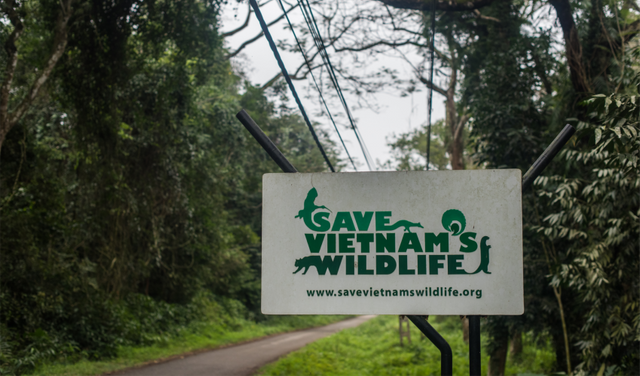
Source : IUCN
Save Vietnam’s Wildlife is a Non-profit organisation in Vietnam that was founded due to a critical need to secure the future of the local wildlife. Most of the work performed is in partnership with Cuc Phuong National Park that supports the management and operation of the Carnivore & Pangolin Conservation Program (CPCP).
The CPCP project was specifically aimed at the Owston’s Civet that was overseen by Fauna and Flora International in Cuc Phuong National park. It then became the Small Carnivore Conservation Program and then expanded to include other species of Mustelids and Viverrids. 2005 saw the same team founding the Asian Pangolin Conservation, thus becomming the first organisation working with Pangolins in Vietnam. In 2007, both programs combined and became the Carnivore & Pangolin Conservation Program (CPCP) which is a conservation program for all species of small carnivores and Pangolins in Vietnam.
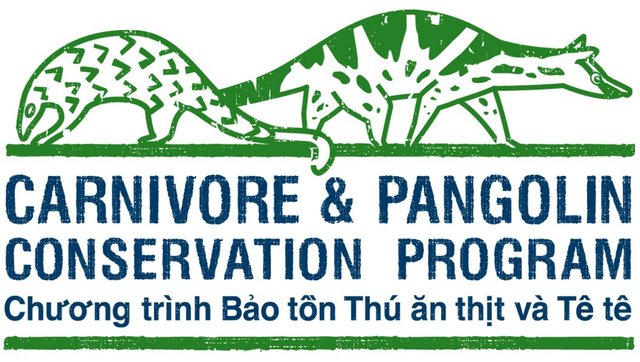
Source : Save Vietnams Wildlife
Today the CPCP focuses on rescue, rehabilitation and the release of carnivores and Pangolins that have been confiscated from the illegal wildlife trade and also developed the global conservation breeding program for threatened carnivores and Pangolins. SVW has been developed to ensure the future of the wildlife and biodiversity in Vietnam, with habitat loss and illegal wildlife trade being the biggest effect on the population declining the SVW is engaged in supporting the confiscation of wildlife, rescuing & rehabilitating and releasing animals into secured habitats that support the conservation of wild populations. The SVW carries out research to attempt to increase the understanding requirements of both wild and captive populations, educate and train the public and Vietnamese law enforcement officers that increases positive perceptions and attitudes towards wildlife. The charity also works to progress animal welfare standards for animals in the care of the CPCP and promote these findings to zoos and rescue centres in Vietnam.
Rescue and Rehabilitation
Due to poaching driven by the illegal wildlife trade it is having a huge and devastating impact on wild animals in Vietnam. Carnivores and Pangolins account for the largest portion of the wildlife seen in the trade, with growing demand from buyers and species population in decline, the prices for individual animals, bushmeat and animal Pelts has never been higher.
CPCP has now rescued and rehabilitated over 250 individual Carnivores and Pangolins, of which seven species of carnivore and one species of Pangolin have successfully been released back into the wild. With the centre having the ability to rescue and rehabilitate all species of small carnivore and Pangolin that are found throughout Vietnam, whilst also sharing this information with zoological and conservation based organisations around the world, the global outlook for the protection of exotic species is improving year on year.
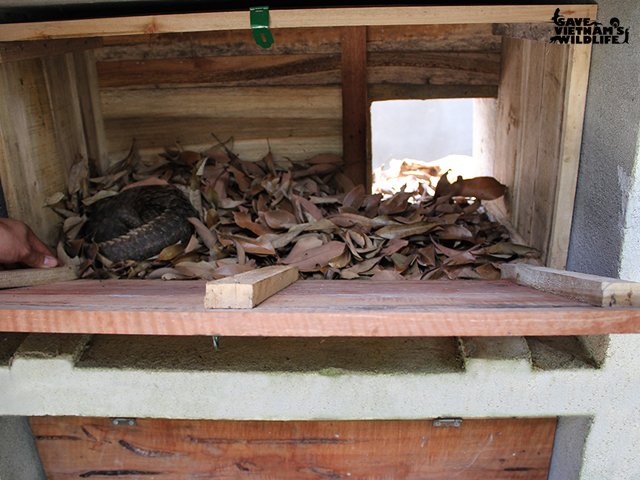
Source : A typical Pangolin bedbox at the Rehabilitiation centre
Reintroduction
The overall aim of the CPCP is that all rescued, rehabilitated and captive born carnivores and Pangolins are successfully released back into the wild into a location where there is human protection and enough habitat to allow for their survival. During the Pre-release preparation, all the animals will have health checks, feeding habits will be noted, normal behaviour will be observed and their weight and body condition will also be closely monitored and recorded throughout the process. When an animal is ready to be released a team is sent out to carry out field surveys that evaluates the release locations for their suitability. To maximise the survival rate of the released animals the condition of the habitat, wild population of local species and the hunting pressures for the observed area are considered to ensure that the wild populations are fully supported and protected. The CPCP has successfully released:
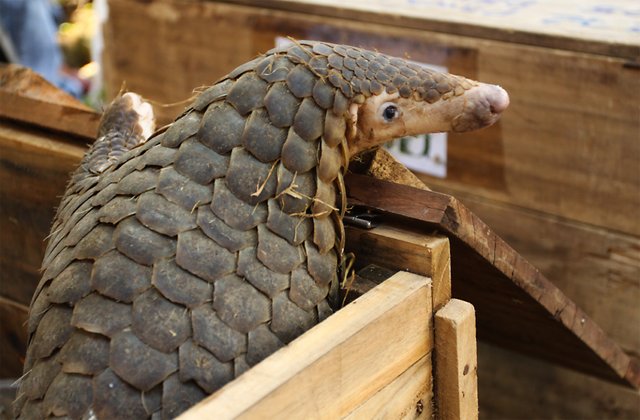
Source : Sunda Pangolin emerging from his box after being cleared for release
- Sunda Pangolin (Over 75 animals in two years)
- Owston’s Civet
- Common Palm Civet
- Masked-palm Civet
- Leopard cat
- Small Indian Civet
- Large-toothed Ferret Badger
Captive Research
To assess the behaviour of captive Sunda Pangolins, the CPCP worked with the Manchester Metropolitan University to study the activity patterns of individuals. The study found that the Pangolins spent a short time actively feeding and moving, and that further enrichment was required to increase their activities. Pangolins are difficult to keep in captivity due to their specialised and very expensive diet that is difficult to obtain. Historically Pangolins die within a few weeks of capture due to a poor understanding of their dietary needs and their health and social requirements.
The CPCP is the first conservation program of its kind in Vietnam where they have been successfully rehabilitating Pangolins for over seven years. Pangolins are the most trafficked animal in the world with both species of Asian Pangolin listed as Critically Endangered on the IUCN Red List. It is important for the CPCP to learn how to breed pangolins for conservation purposes that will help provide an insurance policy population, and to prepare ex-situ conservation programs as the wild population continues to rapidly decline.
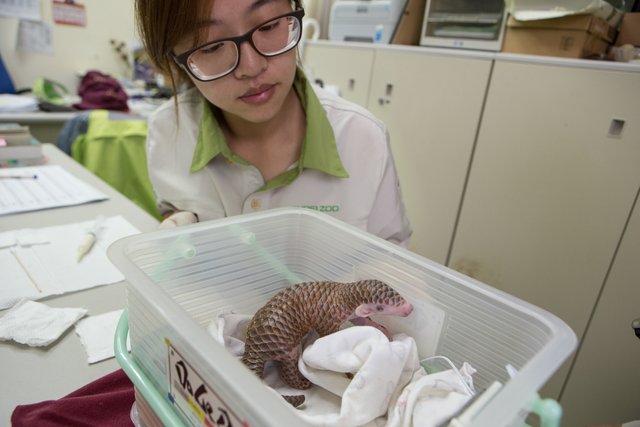
Source : Thanks to the efforts of organisations worldwide we are gaining an understanding into these elusive animals that will only strengthen their chances of survival as a species
Pangolins are going extinct
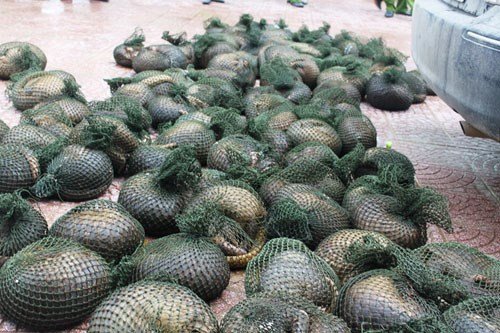
Source :Captured Pangolins, their capture is both immoral and unsustainable
How you can help
As a non-profit organisation receiving no financial support from the government, they rely heavily on the generosity of international supporters to aid their work to help secure a future for Carnivores and Pangolins in Vietnam. You can donate HERE to allow them to buy the equipment they need to carry out their daily duties to care for all the animals at CPCP. You can Sponsor an Animal which will help provide food and upgrade their enclosures that gives confiscated animals a more enriched life before being rehabilitated back to the wild. You can also Join the Volunteer program donating your time and skills to protect wildlife. Most importantly you can spread the word! Letting your friends and family know about this amazing species as well as an amazing charity is an invaluable way forward to save the future of wildlife.
Final Thoughts
If we do not act quickly, like most species that will feature here on my blog we will lose the Pangolin completely from the wild before anyone has had the chance to fall in love with them. There are some amazing charities out there trying to save the Pangolin from extinction. Also remember to key in the 17th February 2018 for world Pangolin day, your friends and relatives likely haven't heard of them or are aware of their plight, one look at them and i'm sure they'll instantly want to help, these animals desperately need it.
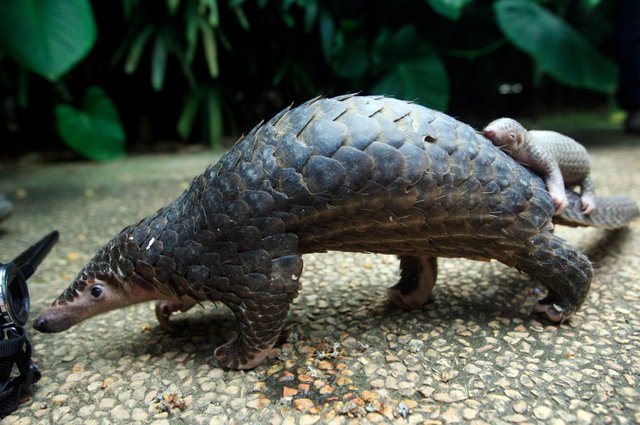
Source : Pangolin mother & baby
If you found this post interesting you may find my previous editions of Charity spotlight worth a read:
- Animal Charity Spotlight #2 Orangutans of Borneo
- Animal Charity Spotlight #1 Is there hope for Elephants

I like it when people can use their influence to support a good cause. Biodiversity is our lives and we must put resources together to make sure we do not deplete the planet of it's resources. Well done amavi
Thank you for your kind words :)
Very interesting... I enjoy your publications a lot... I wish you a lot of success here.
Thank you, glad you liked it :)
@cryptohustlin has voted on behalf of @minnowpond.
If you would like to recieve upvotes from minnowponds team on all your posts, simply FOLLOW @minnowpond.
@originalworks
The @OriginalWorks bot has determined this post by @amavi to be original material and upvoted(1.5%) it!
To call @OriginalWorks, simply reply to any post with @originalworks or !originalworks in your message!
@minnowpond has voted on behalf of @minnowpond.
If you would like to recieve upvotes from minnowponds team on all your posts, simply FOLLOW @minnowpond.
Congratulations @amavi! You have completed some achievement on Steemit and have been rewarded with new badge(s) :
Click on any badge to view your own Board of Honor on SteemitBoard.
For more information about SteemitBoard, click here
If you no longer want to receive notifications, reply to this comment with the word
STOPResteemed by @resteembot! Good Luck!
Curious?
The @resteembot's introduction post
Get more from @resteembot with the #resteembotsentme initiative
Check out the great posts I already resteemed.
Extremely intriguing... I make the most of your distributions a considerable measure... I wish you a great deal of progress here.
Thankyou :)
How interesting! I've worked with many wildlife/animal places and have never heard of this critter. Thanks for the intro to new animals and for the links in how to help them...you've got a new follower :)